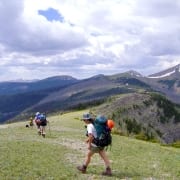“Rise up, walk through the length and breadth of the land, for I will give it to you.”
– Genesis [13:17]
WALKING THE LENGTH AND BREADTH OF OUR FAITH
The great father of our religious heritage, Abraham, was from the tenth generation since Noah. His father, Terah, had taken Abraham from his home in Ur, to journey through the land of the Canaanites. His father never made the it into Canaan. Distracted from his mission, stopping instead in Haran, where Teran died.
After his father’s death, Abraham was spoken to by God, who said; “Go from your country and your kindred and your father’s house to the land that I will show you.” – Genesis 12:1 Abraham began a long journey throughout the region, taking with him, his immediate family and nephew Lot. Along the way they were beset by many struggles, including a famine. Desperate to avoid the loss of his health and wealth, forgetting God’s command, Abraham led them into Egypt. Abraham like his father became distracted and lacking in faith moved away from God’s plan.
While in Egypt, Abraham told his wife, Sarah, to tell pharaoh that she was his sister. An act of concealment to avoid having Abraham being murdered. For his wife, Sarah, was beautiful and Abraham was sure that Pharaoh would murder him to possess his wife.
The plan worked for a while, Sarah was fully accepted in Pharaoh’s house. Abraham was treated well by the Egyptians. Pharaoh takes Sarah as his wife, but soon develops sore and other plagues caused by God. Pharaoh confronts Abraham and asks him why did he lie? Why did he not tell Pharaoh that Sarah was his wife. Fearing more retribution from God, Pharaoh him banished from Egypt.
Along the way, both Abraham’s and Lot’s herds grew. Causing animosity between Abraham and Lot. Abraham tells Lot to choose a place where he would go and Abraham would take what was left. Lot chose a large parcel of land that would be best for his herds, but also contained the city of Sodom. A place that was notorious for its wickedness and sinful behavior.
Lot moved his herds and settled in the city of Sodom. Abraham took over what was left. A final settlement and finally Abraham was in the land that God wanted him to be. After years of traveling to Canaan and being distracted by his own fears and hearing the sirens of other lands. Abraham was where God wanted him.
God then issued a request to Abraham to, “ “Rise up, walk through the length and breadth of the land, for I will give it to you.” – Genesis [13:17] Abraham was now finally where he should be and God had told him to inspect all that he owned. Not just to see, but walk its length and breadth. To immerse himself in all that God was giving him. Not just see the trees and water, but to be with the land. To explore every facet of this land that he had inherited from God.
Metaphorically, we can see this same thing in our lives. Our faith is the land that God wants us to explore and become immersed. Not just stand by and watch the unfurling of our faith, but to experience and invest our energy into our faith. To move beyond just saying our prayers and reading the Bible. But to explore our prayers and the Bible. To become deeply immersed. To learn the ways of the world and what to avoid. To wonder at the majesty of all creation. To wonder about the stars, to observe the spiritual winds of our lives. To not become attached to the shiny and temporary glimmers that the ways of the world. To not live our lives in fear and desperately try on our own to solve our problems through worldly ways.
God has a great bounty of spiritual wealth awaiting us. God will protect us and guide us on this journey. In times of trial he will hear. We will never be alone.
Blessings, until next time,
Bruce L. Hartman



